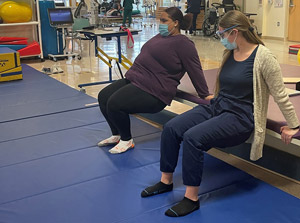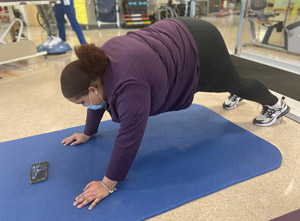I told my mom and my doctor that I wanted to come back to Children’s Specialized Hospital, said Ariely. I knew the program had everything I needed to take control of my diabetes again.

At 15 years old, Ariely Garcia was diagnosed with pre-diabetes after routine blood work showed high glucose levels in her system. Her doctor was concerned that if her glucose levels were to rise, she would develop type 2 diabetes and would be at even higher risk for disorders of the circulatory, nervous, and immune systems. Ariely was tasked with lowering these levels, but was unsuccessful, and faced the diagnosis of type 2 diabetes shortly after her sixteenth birthday.
Historically, type 2 diabetes was referred to as adult-onset diabetes. However, this chronic condition can develop during childhood or adulthood with improper nutrition, exercise, and ill-maintenance of a healthy weight. While there is no cure for type 2 diabetes, it has been proven that weight management, healthy eating, and being active can help manage the condition. In some cases, medications may be needed, in addition to lifestyle changes.
Seeking Support
The following year proved to be challenging for Ariely. As a teenager, she was juggling school work, friends, home life, and the complexity of her diagnosis. In addition to her normal responsibilities, managing her health and wellbeing became a challenge for her. During a follow-up with her physician, it was recommended that she seek an inpatient program to take control of her health. Shortly after, Ariely came to Children’s Specialized Hospital in New Brunswick to take part in the Chronic Illness Management Program (CIMP).
 “I was so nervous when I first stepped into the hospital,” said Ariely. “I was so far away from home.”
“I was so nervous when I first stepped into the hospital,” said Ariely. “I was so far away from home.”
Despite her nerves, she got to work. As part of her Chronic Illness Management Program, Ariely met with a variety of disciplines including recreational therapy, physical therapy, occupational therapy, nutrition, education, and psychology. She learned about healthy eating habits, cooking, reading food labels, and exercise.
After four weeks in the Chronic Illness Management Program, Ariely was discharged just before Spring and felt confident in taking control of her health. Having so much support during her inpatient stay, Ariely said her greatest fear going into the program was “falling off the wagon” when she arrived home.
By Fall, Ariely fell to her fear and stopped taking the medication she needed to control her diabetes. Recognizing this major setback, she made an appointment with her doctor to determine how she could get back on track.
“I told my mom and my doctor that I wanted to come back to Children’s Specialized Hospital,” said Ariely. “I knew the program had everything I needed to take control of my diabetes again. This time, I was ready.”
A Fresh Start
 The beginning of 2021 was an opportunity for a fresh start and getting Ariely back on track to take control of her health. With the support of her mother and her doctor, she did just that by re-admitting to the Chronic Illness Management Program at Children’s Specialized Hospital once again. This time, as she describes, was her time to shine.
The beginning of 2021 was an opportunity for a fresh start and getting Ariely back on track to take control of her health. With the support of her mother and her doctor, she did just that by re-admitting to the Chronic Illness Management Program at Children’s Specialized Hospital once again. This time, as she describes, was her time to shine.
Ahead of Ariely beginning the program, the CIMP team worked together to develop a plan that would truly cater to her home environment; giving her the resources, skills, and education she needed to thrive once back at home. Again, she met with disciplines including physical therapy, nutrition, recreational therapy, occupational therapy, psychology, and education to set herself up for success when home.
“Going into the program for a second time, I was less nervous and just ready to get back on track,” said Ariely. “I knew what to expect and I was on board with the hard work I needed to do.”
Getting to Work
After settling into her room, Ariely met with the entire multidisciplinary team to develop a plan during her time here. Ultimately, she worked in six core areas:
Physical Therapy
During her physical therapy sessions, Ariely worked with her therapist to strategize and learn how to stay active while at home. Together, they identified an App that Ariely could access for free on her smartphone which featured videos and tutorials to workout in her natural setting. To individualize Ariely’s care, the workouts often required no additional equipment. Her therapist also showed her how to modify the exercises when they may have been too challenging to complete.
Occupational Therapy
Ariely also worked with occupational therapists to determine how she can overcome the challenges presented to her. Together, they discussed barriers that Ariely faced and talked about how overcoming these challenges would help her reach her goals. In one session, Ariely expressed that a challenge was consistently completing her schoolwork. They worked together to identify the role that completing school work played in her ultimate goal of graduating high school, furthering her education, and securing a career.
Nutrition
A dietitian helped Ariely learn different types of food that were good for her health. By learning to read food labels and understanding how different food groups interacted with her body, Ariely became more comfortable making meal choices that were right for her. Taking the next step, Ariely became comfortable in the kitchen by learning to cook these meals, as well. With help from her occupational therapist and dietitian, Ariely attended cooking classes where she grilled chicken, constructed a kale salad, and prepared a breakfast smoothie.
Recreational Therapy
During recreational therapy, the team worked with Ariely to make exercise fun. In this discipline, the goal is to learn through play. A memorable session for Ariely was a competitive, but friendly game of monopoly. After each turn, Ariely and her recreational therapist selected an exercise of her choosing to perform. During one session, she did sit-ups, pushups, and planks before each of her turns in the game.
Psychology
Ariely met with the psychology team to talk about her stressors and identify the challenges, actions, and behaviors that contributed to her diabetes diagnosis. Ariely says that since a young age, she always wanted to seek these services, but had trouble opening up and did not know where to begin to receive the help she needed. With the help of the psychology team, Ariely learned to communicate and cope with these challenges in a healthier way.
Medical Education
Our Certified Diabetes Educator worked closely with Ariely to educate her on her diagnosis and equip her with the skills she needed to manage her diabetes. Together, they created and played educational games about types of foods, environments, and skills that would help Ariely thrive. They embraced what Ariely has learned through other disciplines in the program and also identified opportunities for her to continue moving forward. A memorable part of theses sessions for Ariely were game-day Fridays, where these education sessions were turned into games like Jeopardy.
Moving Onward and Upward
Looking back, Ariely says that her readmission to the CIMP prepared her even more than she could have ever imagined. She said, “I really know what I have to do and I’m ready now more than ever to take it on.”
She also shared that her favorite part in the program was the education she received about her diagnosis. She added, “Now I really understand the effects diabetes has on me and I don’t need to rely on anyone to do what I need to do to control it,” she said.
“While at Children’s, I’ve felt that there was always at least one person that I could turn to, to vent, to talk about my feelings, or to answer my questions,” she added. “I didn’t need to feel so alone.”
Ariely says her advice for anyone entering the Chronic Illness Management Program would be to make connections with the care team and people available. She encourages others to learn, ask questions, and embrace the situation they’re in.
Ariely was sent home the day following her eighteenth birthday. Looking forward, she is excited to finally take control of her health and take home the skills she learned as she enters adulthood.